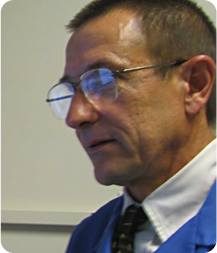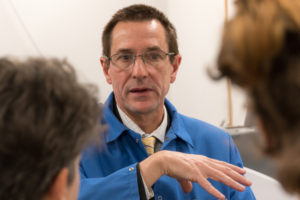Stepping into Jay Powell’s lab at Analytical Answers would overwhelm a person not used to scientific equipment, bright lights and measuring devices. Not that the lab is overly jammed with assorted instruments, but as a Senior Fourier Transform Infrared (FTIR) Spectroscopist Powell’s job requires he master a few disciplines.
While his study is in the field of molecular spectroscopy, the FTIR spectrometer is but a single tool. Mostly because the largest application of molecular spectroscopy is the identification and characterization of organic and polymeric compounds, which often requires application of other instrumentation techniques and devices.
 Powell explains that these include “TGA (Thermogravimetric Analysis), DSC (Differential Scanning Calorimetry), GC (Gas Chromatography), and…classic wet chemical preparation and analysis techniques such as gravimetric and volumetric analysis, pH and ion measurement, Soxhlet extraction, distillation, and others, up to and including organic synthesis.”
Powell explains that these include “TGA (Thermogravimetric Analysis), DSC (Differential Scanning Calorimetry), GC (Gas Chromatography), and…classic wet chemical preparation and analysis techniques such as gravimetric and volumetric analysis, pH and ion measurement, Soxhlet extraction, distillation, and others, up to and including organic synthesis.”
The vast variety of analysis options reflects directly the approach the laboratory takes with all its work. Find the best approach to solve a problem. Powell agrees and his mantra is to select and recommend the best way to analyze a substance or challenge.
Though he got his chemistry Ph.D. in 1984, he hasn’t been so laser focused on scientific discovery to explore other professions – if only to provide himself with perspective on how the world works. It’s a parallel to a lab approach to solving a problem. Learn as much as you can about an item or situation before you attempt to dissect and/or analyze it.
Powell’s experience covers quite a few areas.
“Since starting my career, I’ve been an instructor, researcher, software engineer, applications chemist, instrumentation engineer, product manager, marketing specialist, independent consultant, magazine publisher, accountant, IT specialist, web designer and more,” he said.
Powell remains drawn to chemistry likely because of the influence of his high school chemistry teacher.
“Mr. Massina, had a large influence. He taught all the important things a high school kid wants to know: how to make gunpowder; how to make smoke bombs; how to make contact explosive (nitrogen triiodide),” he said.
Then, in college, Powell discovered his enjoyment of the chemistry work was higher than in other specialties, so he stuck with it. While certainly enamored of scientific discovery, he says not everyone has that love of discovery. When asked what makes science great, Powell shared a philosophical insight.
 “What makes chocolate tasty? What makes a rainbow stunning? What makes a rainbow? What makes the mosquito find you while you’re contemplating the rainbow? How can I make the mosquito go away?” he said. “All of the whats, hows and whys of the physical world is not what makes science great, it is science. Knowing and understanding the details of the physical world allows us to adapt it to our benefit, and to minimize or eliminate those factors which could be to our detriment. What other reason do you need?”
“What makes chocolate tasty? What makes a rainbow stunning? What makes a rainbow? What makes the mosquito find you while you’re contemplating the rainbow? How can I make the mosquito go away?” he said. “All of the whats, hows and whys of the physical world is not what makes science great, it is science. Knowing and understanding the details of the physical world allows us to adapt it to our benefit, and to minimize or eliminate those factors which could be to our detriment. What other reason do you need?”
As Powell continues his scientific exploration on the shiny equipment in the busy lab, you can be sure if there’s a chemical problem to be solved, he’ll find the best approach and then make it happen.
Jay will be speaking on October 18 in our Lunch and Learn Webinar on Polymer Analysis of Biomaterials, Composites,
Encapsulants and Adhesives. This webinar will focus on Infrared Spectroscopy, a technique that measures the light absorbed by the bonds between atoms in a molecule and reveals the molecular structure, which can therefore be used to characterize organic and polymeric samples. You can learn more and register here.
